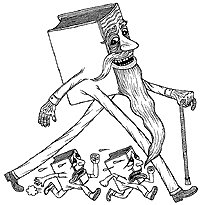Which I just mentioned in a private message to you, before seeing this! Yes, I have the Stoddard-Hodgson book, but haven't yet read it.
Based on the Amazon reviews , it's book I might just check out.

Which I just mentioned in a private message to you, before seeing this! Yes, I have the Stoddard-Hodgson book, but haven't yet read it.


For me a guideline re "falling into neglect" is how often a once-well-known writer gets discussed in specialist SFF forums such as this.
This would make a great reading list!
When I was at school I read quite a lot, but not a lot of old classics. Some Shakespeare for class, but that was more of an educational language reason then for any great enjoyment. Young people generally don't want to read old material. And I'm sure that goes for a couple of generations ago too. It is not like 50 years ago kids were hoovering up ancient texts.
But now with the internet it is much harder to get kids into old books, or any books. I find I read much less books due to the internet too.
I suppose teenagers still read an occasional classic for school? That is where they have to get some exposure. Hopefully without it all seeming completely dull.
Regarding Science Fiction, it is simply the nature of the genre that even a "classic" will soon lose its magic. Though the "Time Machine" is still superb, and an easy read.
Rather than starting a new thread, I thought I'd put this news here. Gollanz is starting a Golden Age Masterworks series:
Gollancz’s Golden Age Masterworks!
John Brunner is being scrubbed off my library shelves. They only have so much room so they have to periodically make room for new authors. The library offers a service where you can order a book from another library in the state, big selection you would think. Except it appears that he is being scrub off all the shelves. After much searching the library reference agent came up with The John Brunner Collection Volume Two: The Wrong End of Time, The Ladder in the Sky, and The Productions of Time. 2 to 3 weeks waiting time. No mention of Stand On Zanzibar. He's works are still easily found on line. Some had suggested that these on line finds might be signs of people dumping the books and not a sign of a diverse secondary market.
I guess his style of consequences over characterization is not in demand. Plenty of people writing what he wrote about but they have the advantage of seeing it in real life. His books haven't made it to the libraries ebook system, but that system is pretty much patchworked and you literally have to search each source of ebooks, no universal search through all their ebooks yet.
Rereading Sheep Look Up, while the overall severity isn't as deep as predicted, there are plenty of situations that are right on the mark. The narrow trends of extremism are widening out into popular channels. A thought I picked up from looking at Sheep Look Up again, is the idea that superstition might play a bigger role in the obstacles that could disrupt an orderly global wide march into the future. I never looked at superstition as anything that might take on a bigger role in the future. It took a new look at an old book for that thought to occur to me.
There are some stories and authors, including a lot of fluff, that will be with us forever (I like fluff).
Some that come to mind are
The Man Who Counts
The City and the Stars
Against the Fall of Night
The Menace From Earth
The Caves of Steel
The Sackett novels
The Colonel's Tiger
Novice
I don't think they will ever be neglected.
As an aside, Heinlein's sales are still holding up OK.
That is very interesting and a valid point. That has never been a consideration for me, and it probably never will, but now that you have mentioned it I am quite surprised that I have not really thought about SF like that, even if to discount that as a criterion.This may be a minor point in this discussion, but for science fiction (I have little interest in fantasy and practically none in horror) if it is a choice between a book published 1950 and one published 2020, and everything else is "equal", I would buy the 2020 one on the theory that the STEM background is more up to date and accurate.
| Thread starter | Similar threads | Forum | Replies | Date |
|---|---|---|---|---|
|
|
How many characters? | Writing Discussion | 36 | |
| J | Plural Possessive 's s's too many sss | Grammar & Spelling | 12 | |
|
|
Bronze Age Sword Discovered in Germany That Still Shines | Science & Nature | 2 | |
| O | How many Protagonists (or are they)? | Writing Discussion | 23 | |
| D | Old fashioned Sherriff story, too many themes? | Writing Discussion | 10 |
